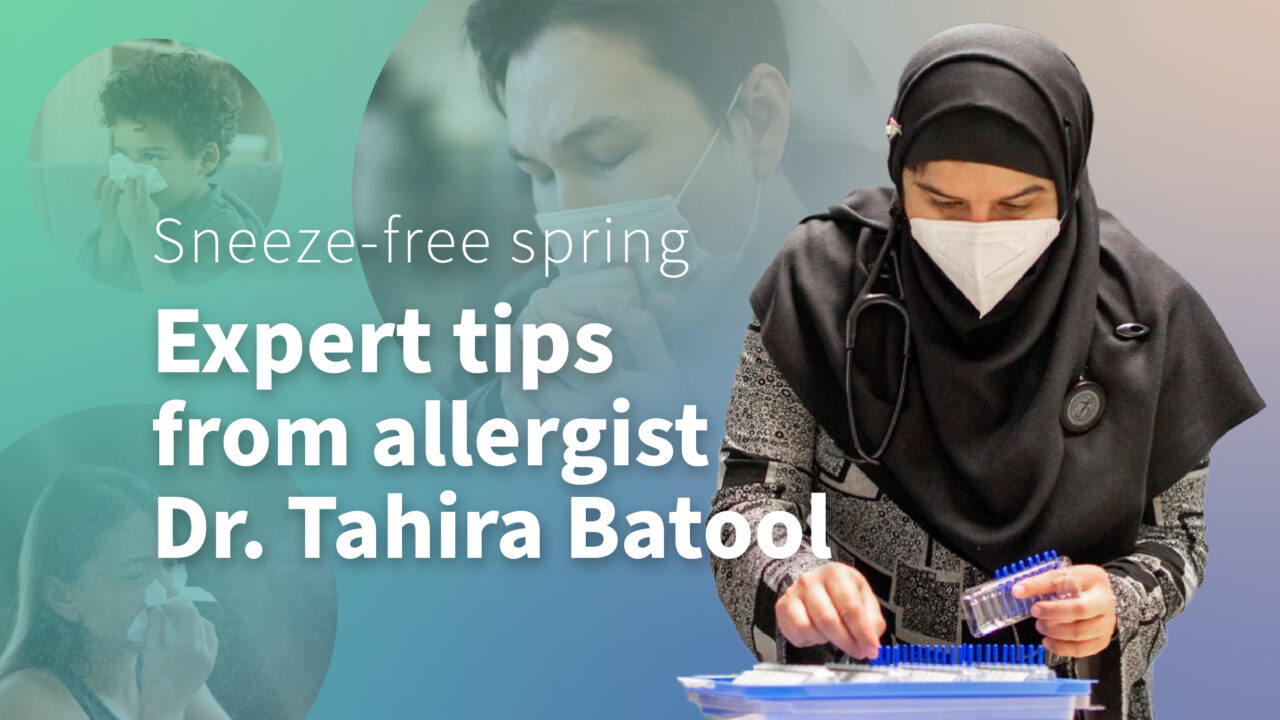There’s nothing better than enjoying the fragrance of blooming flowers, the songs of chirping birds, and the warmth of … ah-ah-ACHOO! … springtime.
Well, that might be the case for some. But for the 20 to 25 per cent of Canadians who suffer from seasonal allergies, this time of year can mean sneezing, runny nose, and itchy eyes.
What are seasonal allergies?
Also known as hay fever or seasonal allergic rhinitis, symptoms of seasonal allergies appear only at certain times of the year and are often caused by a fine, powdery substance called pollen that is produced by certain trees, grasses, or weeds.
In Canada, the first wave of pollen production is from trees and occurs in late April to May. This is followed by pollen production from grass and weeds, and occurs in late May to mid-July as well as from mid-August to October.
For someone suffering from seasonal allergies, this is a long time to deal with symptoms… so, what can be done to help mitigate all the sneezing, runny nose, and itchy eyes?

Meet our allergist Dr. Tahira Batool
Dr. Tahira Batool is an allergist in our Allergy Clinic at Uxbridge Hospital. She says the first line of defence for all allergies is over-the-counter antihistamines. She recommends a 24-hour, non-drowsy allergy medication, but not Benadryl because it has the worst side effects compared to other options.
“If first trying over-the-counter antihistamines and then a prescription from a family doctor both fail, and the symptoms become more bothersome, then it is time to see an allergist,” says Dr. Batool.
An allergist is a doctor who has specialized in internal medicine or paediatrics and completed additional training in allergy and immunology. Dr. Batool first received her medical degree from Punjab University in Pakistan. She then completed her specialization in internal medicine at Queen’s University in Kingston and her sub-speciality training in allergy and clinical immunology at McMaster University in Hamilton.
“As an allergist, I help patients first find out if they are allergic and not just unnecessarily avoiding something,” says Dr. Batool. “Then I help the patient understand exactly what they can do to help minimize exposure and their allergies.”

Tips to keep seasonal allergies under control
For individuals suffering from seasonal allergies, one of the most important things to do to minimize exposure and allergies is to seal off the indoors from the outdoors.
“Keep your windows closed,” says Dr. Batool. “If your windows are open, you are letting all the pollen in. There’s now no difference between the indoor and outdoor environment. This would make your symptoms much worse.”
Dr. Batool also recommends using an air conditioner and investing in air purifiers to reduce allergen exposure.
For outdoor activities, timing is essential. Dr. Batool suggests picking times when the pollen counts are low and suggests The Weather Network as a resource to know the current and upcoming forecast.
“If you go to their website, they have an allergy report with pollen forecasts. You can look up the pollen count for today, tomorrow, and the day after to help you plan your time outdoors.”
Here are some other tips from Dr. Batool to keep seasonal allergies under control:
- Go outside after it rains because the water can wash pollen away.
- Pollen can adhere to fabrics, such as towels or clothes, so keep laundry indoors.
- A saline solution can help with nasal congestion and flush out mucus and allergens.
- In your bedroom, consider the use of a portable high-efficiency particulate air (HEPA) filter.

Information about our Allergy Clinic
While many find relief from symptoms by avoiding allergens and utilizing over-the-counter medications, if seasonal allergies persist despite these best efforts, remember that help is readily available.
The Allergy Clinic at Uxbridge Hospital offers outpatient clinical services for referred adults and children.
If you think the Allergy Clinic is right for you, speak with your physician today and reclaim the joy of spring – symptom-free.
